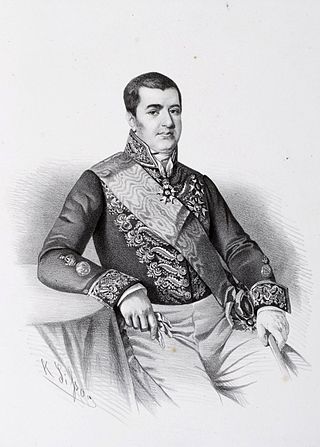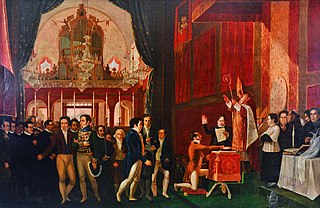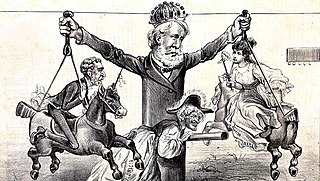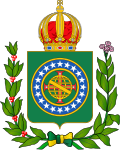A head of state is the public persona of a sovereign state. The specific naming of the head of state depends on the country's form of government and separation of powers; the head of state may be a ceremonial figurehead or concurrently the head of government and more.

Politics in Portugal operates as a unitary multi-party semi-presidential representative democratic republic, whereby the Prime Minister of Portugal is the head of government, and the President of Portugal is the non-executive head of state with several significant political powers they exercise often. Executive power is exercised by the Government, whose leader is the prime minister. Legislative power is primarily vested in the Assembly of the Republic, although the government is also able to legislate on certain matters. The Judiciary of Portugal is independent of the executive and the legislature. The President exerts a sort of "moderating power", not easily classified into any of the traditional three branches of government.

DomPedro I was the founder and first ruler of the Empire of Brazil, where he was known as "the Liberator". As King Dom Pedro IV, he reigned briefly over Portugal, where he also became known as "the Liberator" as well as "the Soldier King". Born in Lisbon, Pedro I was the fourth child of King Dom John VI of Portugal and Queen Carlota Joaquina, and thus a member of the House of Braganza. When the country was invaded by French troops in 1807, he and his family fled to Portugal's largest and wealthiest colony, Brazil.

The Liberal Wars, also known as the War of the Two Brothers, was a war between liberal constitutionalists and conservative traditionalists in Portugal over royal succession that lasted from 1832 to 1834. Embroiled parties included the Kingdom of Portugal, Portuguese rebels, the United Kingdom, France, the Catholic Church, and Spain.

A commander-in-chief or supreme commander is the person who exercises supreme command and control over an armed force or a military branch. As a technical term, it refers to military competencies that reside in a country's executive leadership, a head of state, head of government, or other designated government official.

The president of Malta is the constitutional head of state of Malta. The president is indirectly elected by the House of Representatives of Malta, which appoints the president for a five-year term and requires them to swear an oath to "preserve, protect and defend" the Constitution. The president of Malta also resides directly or indirectly in all three branches of the state. They are part of Parliament and responsible for the appointment of the judiciary. Executive authority is nominally vested in the president, but is in practice exercised by the prime minister.

The president of Portugal, officially the president of the Portuguese Republic, is the head of state and highest office of Portugal.

The National Assembly of Pakistan is the lower house of the bicameral Parliament of Pakistan, with the upper house being the Senate. As of 2023, the National Assembly has a maximum membership of 336, of which 266 are directly elected by an adult universal suffrage and a first-past-the-post system to represent their respective constituencies, while 70 are elected on reserved seats for women and religious minorities from all over the country. Members hold their seats for five years or until the house is dissolved by the President on the advice of the Prime Minister. The house convenes at the Parliament House, Red Zone, Islamabad.

Politics of the Empire of Brazil took place in a framework of a quasi-federal parliamentary representative democratic monarchy, whereby the Emperor of Brazil was the head of state and nominally head of government although the Prime Minister, called President of the Council of Ministers, was effectively the de facto head of government, and of a multi-party system. Executive power was exercised by the government. Legislative power was vested in both the government and the two chambers of the General Assembly. The Judiciary was independent of the Executive and the Legislative. There was also a fourth power, the Moderating power, exercised by the emperor. The Empire of Brazil was divided into 20 provinces and the Neutral Municipality, capital of the country.

Marcos Cesar Pontes is a Brazilian Air Force pilot, engineer, AEB astronaut, politician and author. He became the first South American and the first Lusophone to go into space when he docked onto the International Space Station aboard Soyuz TMA-8 on March 30, 2006. He is the only Brazilian to have completed the NASA astronaut training program, although he switched to training in Russia after NASA's Space Shuttle program encountered problems. After Jair Bolsonaro's election as President of Brazil in 2018, Pontes was officially nominated to be Minister of Science, Technology and Innovation, a post which he accepted days later and assumed when Bolsonaro's government began. He left the post on 31 March 2022 and in the same year was elected federal senator for his state, São Paulo.

The Constitution of Belgium dates back to 1831. Since then Belgium has been a parliamentary monarchy that applies the principles of ministerial responsibility for the government policy and the Trias Politica.

The Constitution of Uzbekistan was adopted on 8 December 1992 on the 11th session of the Supreme Council of Uzbekistan. It replaced the Constitution of the Republic of Uzbekistan of 1978. It is the supreme law of the Republic of Uzbekistan. The Constitution of Uzbekistan contains six parts and it is further divided into 26 chapters.

The Political Constitution of the Empire of Brazil commonly referred to as the Constitution of 1824, was Brazil's first constitution, issued on 25 March 1824 and revoked on 24 February 1891. In force during the period of the Empire of Brazil, it was issued at the emperor's request, that is, unilaterally imposed by the will of emperor Pedro I, who had ordered it from the Council of State. Pedro had dissolved the Constituent Assembly in 1823 and, through the Constitution of 1824, imposed his own political project on the country. The same Pedro later issued, in Portugal, the Constitutional Charter of 29 April 1826, inspired by the Brazilian model.

The Brazilian Constitution of 1937, promulgated by President Getúlio Vargas on November 10, 1937, was Brazil's fourth constitution and the third of the republican period. It was instituted on the same day as the installation of the Estado Novo, Vargas' dictatorial regime, and aimed to legitimize his powers. The text was inspired by the sanationist structure of the April Constitution of Poland, which was extremely centralizing and granted unlimited powers to the President. It was drafted by the jurist Francisco Campos, Minister of Justice, and obtained the prior approval of Vargas and General Eurico Gaspar Dutra, Minister of War.

Bernardo Pereira de Vasconcelos was a Brazilian politician, journalist, judge and law expert of the Imperial era.

Diretório Monárquico do Brasil was a monarchical institution established in Rio de Janeiro in 1890, one year after the proclamation of the republic, by Afonso Celso de Assis Figueirado, The Viscount of Ouro Preto, the last Prime Minister of the Empire of Brazil, entrusted by the former Princess Regent Isabel, to whom they considered Empress of Brazil after the death of her father Pedro II, in 1891, to organize the actions of Brazilian monarchists. The organization was constituted as an unofficial representation of the deposed heiress to the throne of Brazil and also functioned as a council.

The Portuguese Constitution of 1822 approved on 23 September 1822 was the first Portuguese constitution, marking an attempt to end absolutism and introduce a constitutional monarchy. Although it was actually in force only for two brief periods, 1822–23 and 1836–38, it was fundamental to the history of democracy in Portugal. It was replaced by the Constitutional Charter of 1826.

The regency period is how the decade from 1831 to 1840 became known in the history of the Empire of Brazil, between the abdication of Emperor Pedro I, on 7 April 1831, and the declaration of age of Pedro II, who was legally declared of age by the Senate at the age of 14 on 23 July 1840.

The First Reign was the period of Brazilian history in which Pedro I ruled Brazil as Emperor. It began on September 7, 1822, when Brazil's independence was proclaimed, and ended on April 7, 1831, when Pedro I abdicated the Brazilian throne.

Reverse parliamentarism was the political system in force in the Brazilian Empire during the Second Reign. This system consisted of the Conservative and Liberal parties alternating at the head of the executive branch, based on the choice of the Moderator.





















